- Home
- Frank Herbert
The Ascension Factor: Pandora Sequence Page 35
The Ascension Factor: Pandora Sequence Read online
Page 35
Three fists clenched aloft, though “aloft” to Two was upside-down.
“Now!”
Mack pulled the hatch free and they spilled into the room that had been home for him for the past two years. Two was hit before he cleared the hatch but Three, using him as a shield, foamed both of Brood’s henchmen and they hardened to immobility in blinks. Four tumbled to a ceiling position above Brood.
Brood himself sat calmly strapped into the control couch, his lasgun aimed idly at the Gridmaster. He had not even donned a vacuum suit over his fatigues.
Mack hesitated, his complete attention caught in the sighting dot of Brood’s lasgun, which rested on the brain that controlled all the domestic kelp in the world.
“Dr. MacIntosh, shoot your two men or this thing is history.”
In the immediate few blinks that followed, Mack’s mind unreeled some light-speed logic.
He’s got to be bluffing. If he wipes out the Gridmaster, there’s no way he or anybody else could live on Pandora a year from now.
Mack realized that Brood didn’t have to live on Pandora—not if he had the Voidship Nietzsche.
But he doesn’t have the Nietzsche. Not yet.
“I might add,” Brood said, “that if I’m killed, your OMC is also history. We can accommodate everyone, you see.”
Mack saw the four techs reflected in a console panel. They ducked behind the next row of machines and were tracked by the muzzle of Four’s lasgun. Mack hoped it wouldn’t come to that. The men inside the foam cocoons might survive if they were cut free soon, but a lasgun firefight—messy, depressing.
Brood tapped the intercom on Mack’s console.
“I left my man Ears back there to look after the OMC. You might’ve noticed how young he is. Nervous, too. That’s been a problem in the past. You can ask your holo star what happens when Ears gets nervous. You OK back there, Ears?”
The voice on the intercom cleared its throat a couple of times before answering.
“Y-y-yeah, Boss, they’re talking to me out there. But I ain’t listening.”
“Making progress on the hookup?”
“Yeah.” The voice was young and reedy. “Tech says two more hours, tops.”
“You’re hooking up the OMC?” Mack’s voice sounded as incredulous to him as he felt. “What the hell for?”
“We might want to take this thing out for a little spin, Doctor,” Brood said. “Now, about those two lumps of shit, here. I told you to get rid of them.”
“I won’t do that, Captain,” Mack said.
He unsealed his headpiece and set it aside. He sat in Spud’s control couch and affected the same casual sprawl as Brood’s.
“If you think I’m bluffing …”
“No, you’re not bluffing. You’ll do something. But the Gridmaster is one of your aces. You’re not going to throw it away on something as trivial as my two men.”
“They can leave.”
Mack nodded to his men, and spoke into his headset.
“It’s OK,” he said. “Secure the hatch. Take these two and those four with you.” “They stay!”
“Everybody goes but you and me,” Mack said. “You knew it would be that way, anyway. Your two guards may have a chance, this way. And the others, they wouldn’t get anything done here until this is … settled. Am I right?”
Brood snorted his annoyance and waved them away. They backed out, pulling the wounded behind them, and Brood never wasted a glance. His attention remained on the Gridmaster’s many screens that charted the world. A faint glow leaked out from behind the viewscreens, and Mack noticed a fine mist spreading from his holo stage near the turret.
The mysterious spill of a distinct white glow leaked under the console and licked at the heels of Brood’s canvas boots. A similar glow lighted the base of their holo stage like a small moon on the deck. A reflection of light on the plasteel bulkhead meant that the turret, too, was suffused with this glow.
The kelp, he thought. What could it be up to?
Brood’s lasgun still pointed at the Gridmaster, and by its displays Mack saw that the grids had reformed, but into neat rows of convoluted waves. Either Brood didn’t notice the glow, or he didn’t know it was unusual.
Something’s overriding the whole system!
That, whatever it was, meant that the Gridmaster didn’t matter. It was merely a recording instrument, no longer a tool of manipulation.
“Did Flattery send you?” Mack asked.
Brood’s face, not an unhandsome one, turned up a lopsided smirk.
“Yes,” he said, “he sent me.”
“And are you following his orders, blasting in like this?”
“I am following the … the intent of his orders.”
“Why wasn’t I … ?”
“Because you’re part of the problem, Doctor.”
Brood swung around to face him fully and Mack saw an age in his eyes that was much older than the boyish face that held them. Now Brood’s lasgun pointed at his chest. The light continued its ooze from all of the kelp linkups. A similar glow shimmered on each viewscreen behind the pale- faced captain.
The whole planet’s lighting up, Mack thought. It must be the kelp, but what could it be up to?
“My orders were to secure Current Control and keep the lid on the Tatoosh woman,” Brood told him.
The man’s voice was quiet, almost wistful. “We were to keep Ozette out of the news, replace any of her crew as needed, accompany her up here. The Director thought she might try to—influence you, thereby endangering the security of Current Control as well as the Voidship project.”
“So, you terrorized her, executed her crew, murdered my security squad and are now prepared to destroy Current Control and steal the Voidship—even Flattery won’t buy this one, Captain.”
Brood smiled, showing his fine, sharpened teeth, but his eyes remained hard as plasteel.
“Perhaps it is a family trait, this madness,” he said, his voice rising with an edge to it. “You haven’t heard the scuttlebutt, then. They say Flattery’s my father … whoever my mother was, she was one of his diversions back at the beginning. I was the ‘poor fruit’ of that diversion, as some might say.”
Mack was not as surprised at Brood’s ancestry as he was by the cold anger with which Brood related it.
Hot anger stings, he thought, but it’s cold anger that kills. Mack started to speak but Brood’s upturned hand stopped him.
“Spare me your sympathies, Doctor. It’s not sympathy that I require. I am not the only one so privileged, there are others. If he knows, he finds favor in me because I do not challenge him. If he doesn’t …”
A shrug, a pull at the lip. The ghost-light pooled his ankles.
“Others have not been so fortunate. My mother, whoever she was, for example. The Director requires power and I require power, that is clear. One way or another, I will have it.”
“They’ve called a ‘Code Brutus’ down there. Are you a part of that?”
Brood snapped out a laugh. Those sharpened teeth sent a shudder down Mack’s spine.
“I’m a winner, Doctor,” he said. “I side with winners. I can’t lose. If Flattery wins, then I’ve saved his Voidship for him, saved his precious kelpways, and I win. If Flattery loses, then I’ve captured the Voidship and the precious kelpways to hold for the winner.”
“What happens if one of the others asks your help?”
“Then we’ll suffer a communication breakdown,” Brood said. “That’s nothing new up here, is it, Doctor?”
Mack smiled. “No, no it’s not. We’ve been having that problem all day.”
“So I noticed. My men, they are new to these airwaves, but thorough. We have monitored you here for quite some time—for practice, you understand. I know you quite well, Dr. MacIntosh. How well do you know me?”
“I don’t know you at all.”
“I wouldn’t say that,” Brood said. “You knew that I wouldn’t blow the Gridmaster—not yet. You knew if I really wa
nted your men dead they’d be dead, and yourself along with them. Tell me what else you know about me, Doctor.”
Mack stroked his chin. Leakage from the body of the number-two man drifted close, globs of blood floating with it like party decorations. Mack kept trying to remember which of his men it was, but it wouldn’t come to him. But Brood was in a talkative mood, and Mack tried to keep him at it.
“You’ve covered all bases,” Mack said. “If you take the wrong side, you can always run off with the Voidship—provided you can muster a crew.”
“I have you, Doctor,” Brood smiled. “An original crew member. I have the OMC, too. And I’ll bet that you, a smart man and commander, would have a backup system—probably something handy, like the Gridmaster? Yes, a backup for a backup …”
Brood laughed again, more to himself this time. He reached out his lasgun barrel and nudged the blood globules enough to clump them together and push the glob out of reach toward the turret. A smear of dark blood glistened on the muzzle.
From somewhere deep inside his training-memory, Mack recalled one of his instructors telling him how clean a lasgun kill was, how the charge neatly sealed off blood vessels in its quick cone of burn through the body. In practice, as usual, this wasn’t always the case.
Suddenly, the entire Current Control suite filled with overwhelming, blinding light. A stab of pain punched at both of Mack’s eyes and he covered them reflexively. He heard Brood struggling nearby, bumping a bank of consoles toward the hatch.
“What the hell … ?”
Mack tried his eyes and found that he could see if he squinted tight enough, but tears poured down his cheeks, anyway. What he saw made his already racing heart race faster.
If light were a solid, this is what it would look like, he thought.
Bright was all-encompassing. He could actually feel the light around him not as heat, such as sunlight would deliver, but the pressurelike sensation of an activated vacuum suit.
Mack kicked off and made a grab for Brood’s lasgun as he fumbled upside-down with the hatch mechanism. He missed the lasgun. Brood happened to open his eyes at that moment and the barrel snapped up to take aim between Mack’s eyes.
“Doctor, you just don’t get the picture, do you? I ought to cook you on the spot, but I’ll wait a bit. I’d rather have you and your girlfriend together for that. Now you tell me what the hell is happening here.”
A frightened voice came over the intercom:
“Captain Brood, we can’t see in here. There’s a light filling the OMC chamber, and it’s coming from this brain …”
This was cut short by sounds of a struggle, and Mack assumed that his crew had penetrated the OMC chamber. For the first time, Brood looked worried, perhaps even a little afraid.
“I don’t know what’s going on here …”
“Don’t give me that crap, Doctor,” Brood yelled. A fine spray of saliva skidded into the air around his head.
“It must be the kelp,” Mack explained. He used the calmest possible voice he could muster. “There are kelp hookups in here and in the OMC chamber.”
An eerie, strangled cry came from Brood’s throat, and the man’s eyes widened at something behind Mack’s back. Mack grabbed a handhold and spun around, shading his eyes with his left hand. The bank of viewscreens that faced him seemed to be unreeling wild, random scenes from Pandora, some of them from the early settlement days.
“That’s … those are my memories,” Brood gasped. “All of the places we lived … my family … except, who is she?”
One face faded in and out, turned and returned and gathered substance from the light. Mack recognized her right away: Alyssa Marsh, more than twenty years ago.
A soft voice, Alyssa’s voice, came from all around them and said, “If you will join us, now, we are ready to begin.”
A great hatch appeared in the light, and a thick stillness took over the room. Nothing else was visible. The hatch hung in midair, looking as solid as Mack’s own hand, but the pocket of light that contained them had solidified to exclude Current Control completely—there were no deck, ceiling or bulkheads; no consoles, no sound, nothing but the hatch. Even Brood’s heavy breathing got swallowed up in the light. Mack felt as though he were alone, though Brood was near enough to touch. He was tempted to reach out, just to make sure he was real.
Shadowbox, Mack thought. Maybe they’ve figured out how …
“What is this shit?” Brood asked. “If this is some kind of kelp trick, I’m not falling for it. And if it’s your doing, you’re a dead man.”
Before Mack could stop him Brood fired a lasgun burst into the hatch. But the burst wouldn’t stop, and Brood couldn’t let go of the weapon. The detail of the hatch intensified, and the hatch went through dozens of changes at blink-speed, becoming hundreds of doors and hatches that peeled off one another.
The weapon became too hot for Brood to hold and he tried to let it go, but it stuck to his hands, glowing red-hot, until the charges in it were depleted. Though he struggled to scream, with his veins bulging at his neck and his face bright red, Brood did not issue a sound. When it was over, his eyes merely glazed and he floated there, helpless, holding his charred hands away from his body.
Mack heard nothing during this time, and smelled nothing, though he saw the flesh bubble from the man’s fingers. Still, the hatch waited in front of him. It first appeared as one of the large airlock hatches that separated the Orbiter from the Voidship. Now it looked like the great meeting-room door that he remembered from Moonbase. Every time Mack had entered that door it was to be briefed on some new aspect of the Moonbase experiment on artificial consciousness. Some of those briefings had raised his hair and bathed his palms in cold sweat. The door did not frighten him this time.
He did not doubt that this was an illusion, a holo of near perfection. He had been accustomed to working with fourth- or fifth-generation holograms, but this one felt real. The light had been given substance.
“What did it take to do this?” he wondered aloud. “A thousandth-generation holo?”
Every atom in the room, in the air, on his breath seemed to become a part of the screen. He reached out his hand, expecting to pass through the illusion. He did not. It was solid, a real hatch. Brood was no longer nearby. Like the rest of the room, he had simply ceased to be. All that existed were Mack and the great, heavy doors dredged out of his Moonbase memories. He thought he heard voices behind the door. He thought he heard Beatriz there, and she was laughing.
“Please join us, Doctor,” the soft voice urged. “Without you, none of this would be possible.”
He reached for the handle, and the door changed once again to become the hatch between Moonbase proper and the arboretum that he visited so often throughout his life there. A safe, plasma-glass dome protected a sylvan setting that he loved to walk through. Here at the edge of the penumbra of Earth’s moon he had strolled grassy hillsides and sniffed the cool dampness of ferns under cover of real trees. His mind, or whatever was manipulating it, must want him to open this hatch pretty bad.
The latch-and-release mechanism felt real against his palms. He activated the latch and the hatch swung inward to a room even brighter than the one he stood in. This time, the light did not hurt his eyes, and as he stepped forward a few familiar figures materialized from it to greet him.
I’ve died! Mack thought. Brood must’ve shot me and I’ve died!
Chapter 62
To confront a person with his shadow is to show him his own light.
—Carl Jung
The Orbiter’s fire-suppression crew floated in their odd vacuum suits up and down the passageway outside of the OMC chamber. Most of them were women, as was the majority of the Voidship crew. Each was equipped with a beltful of tools for bypass or forced entry, and several pushed smothercans of inert gas ahead of them as they patrolled behind Beatriz. All of them had left their job stations to rally against the threat of fire. Only uncontrolled vacuum was more feared than fire aboard the space
station. The pithy jokes that they tossed among themselves through their headsets offset the nervousness that their eyes betrayed.
Beatriz had suspected from the start that the young security who had sealed himself inside the OMC chamber was trying to get the OMC on-line. The firefighting captain who stayed with Beatriz was a structural engineer named Hubbard. Like all of the fire-fighters aboard, Hubbard was a volunteer and accustomed to getting twice as much work done in half the time. He deployed his crew according to their real-job skills. In a matter of moments all circuit boxes were opened, their entrails spilling into the passageway.
Four women positioned two plasteel welders, one at the hatchway, one at the bulkhead seam to the OMC chamber. The operating arm of the welder alone weighed nearly five hundred kilos, but here near the axis the only maneuvering problem was its bulk.
These women must’ve been up here from the start of the project, Beatriz thought. They used their feet as she might use her hands, and their vacuum suits had been adapted to accommodate their more dexterous toes. When she first visited the Orbiter she had thought that this skill came from a particular breed of Islander, but later visits proved otherwise. MacIntosh himself exhibited great facility with his feet and toes, and his vacuum suit reflected these changes, too.
“Buy us fifteen minutes,” Hubbard was telling her, “and we’ll be all over that guy.”
“These guys killed my whole crew,” she said. “They joked about eliminating your whole security squad and then they did it. Being all over that guy in fifteen minutes won’t be enough to save that … the OMC.”
“How would you do it?”
Beatriz detected no challenge in his tone, just urgency.
“I helped Mack install some hookups to the OMC chamber. There’s a crawlway that starts in the circuit panel in the next compartment and leads into the control consoles inside the chamber. I know the way and I can …”

 Direct Descent
Direct Descent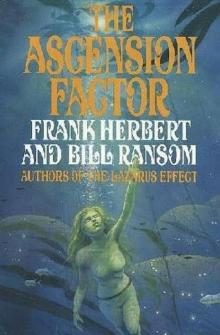 The Ascension Factor
The Ascension Factor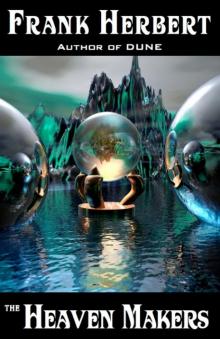 The Heaven Makers
The Heaven Makers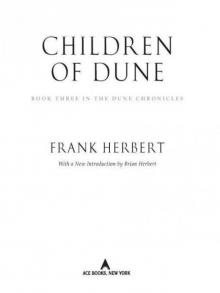 Children of Dune
Children of Dune Old Rambling House
Old Rambling House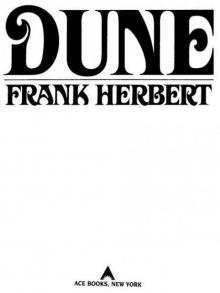 Dune
Dune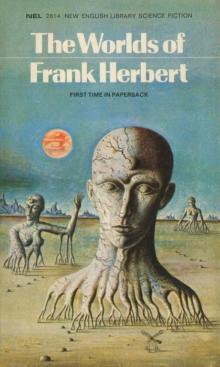 The Worlds of Frank Herbert
The Worlds of Frank Herbert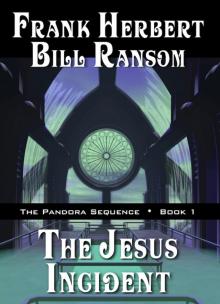 The Jesus Incident
The Jesus Incident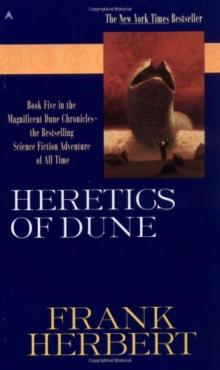 Heretics of Dune
Heretics of Dune Whipping Star
Whipping Star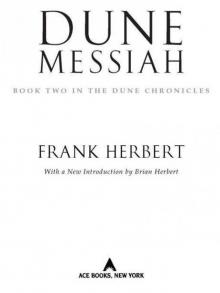 Dune Messiah
Dune Messiah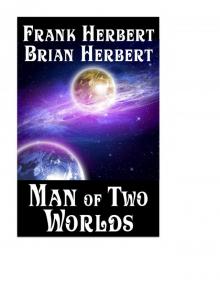 Man of Two Worlds
Man of Two Worlds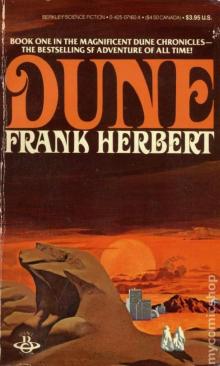 The Book of Frank Herbert
The Book of Frank Herbert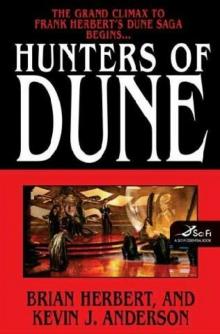 Hunters Of Dune
Hunters Of Dune The Tactful Saboteur
The Tactful Saboteur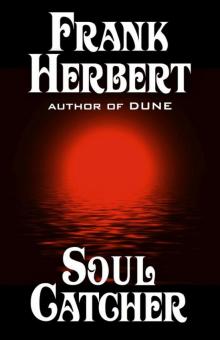 Soul Catcher
Soul Catcher God Emperor of Dune
God Emperor of Dune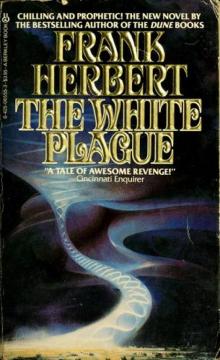 The White Plague
The White Plague The Green Brain
The Green Brain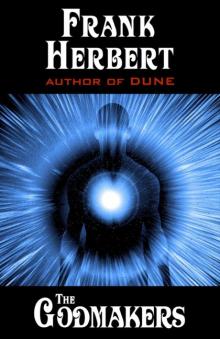 The Godmakers
The Godmakers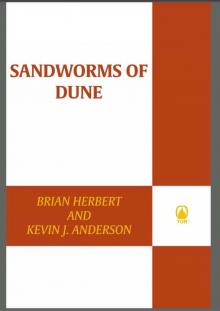 Sandworms of Dune
Sandworms of Dune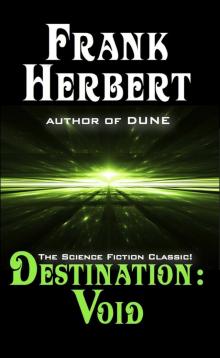 Destination Void
Destination Void The Dosadi Experiment
The Dosadi Experiment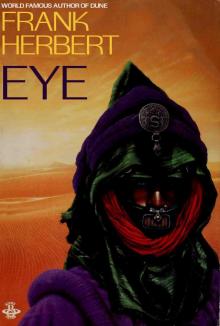 Eye
Eye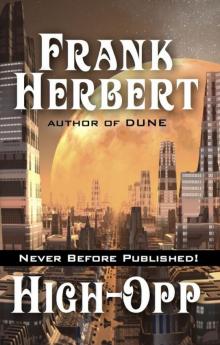 High-Opp
High-Opp The Eyes of Heisenberg
The Eyes of Heisenberg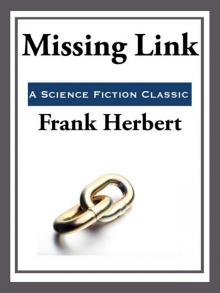 Missing Link
Missing Link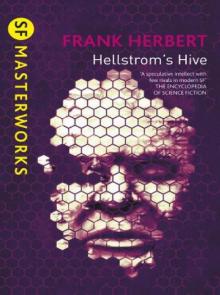 Hellstrom's Hive
Hellstrom's Hive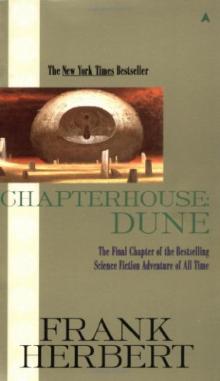 Chapterhouse: Dune
Chapterhouse: Dune The Santaroga Barrier
The Santaroga Barrier The Dragon in the Sea
The Dragon in the Sea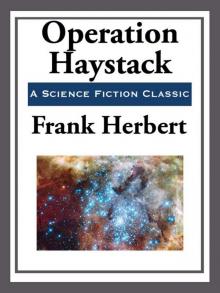 Operation Haystack
Operation Haystack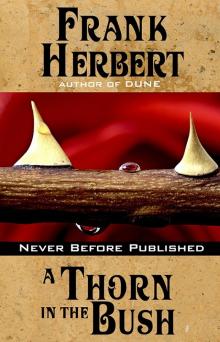 A Thorn in the Bush
A Thorn in the Bush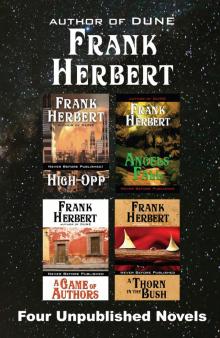 Four Unpublished Novels
Four Unpublished Novels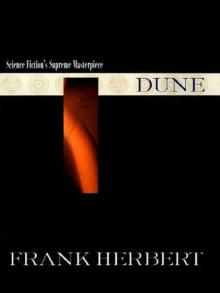 Dune dc-1
Dune dc-1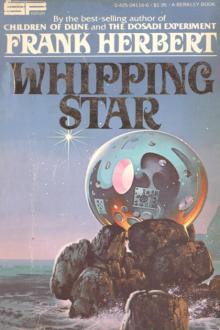 Jorj X. McKie 1 - Whipping Star
Jorj X. McKie 1 - Whipping Star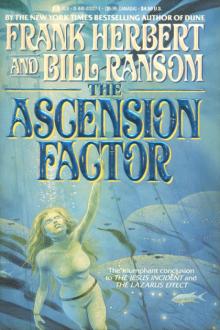 DV 4 - The Ascension Factor
DV 4 - The Ascension Factor Frank Herbert - Dune Book 4 - God Emperor Of Dune
Frank Herbert - Dune Book 4 - God Emperor Of Dune ChapterHouse: Dune dc-6
ChapterHouse: Dune dc-6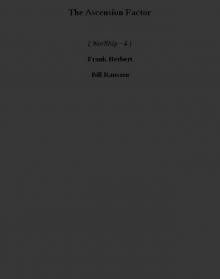 The Ascension Factor w-4
The Ascension Factor w-4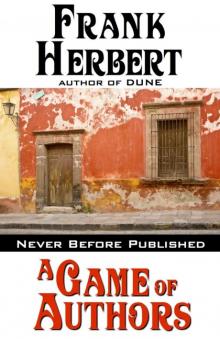 A Game of Authors
A Game of Authors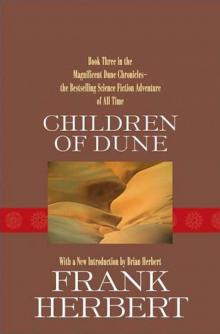 Children of Dune dc-3
Children of Dune dc-3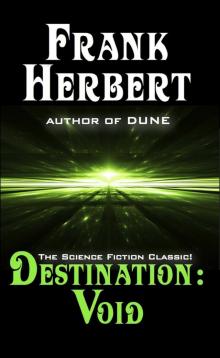 Destination: Void: Prequel to the Pandora Sequence
Destination: Void: Prequel to the Pandora Sequence The Collected Stories of Frank Herbert
The Collected Stories of Frank Herbert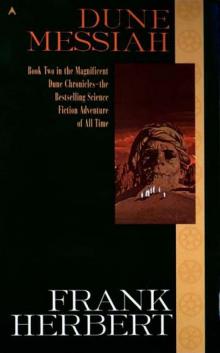 Dune Messiah dc-2
Dune Messiah dc-2 Frank Herbert - Dune Book 5 - Heretics of Dune
Frank Herbert - Dune Book 5 - Heretics of Dune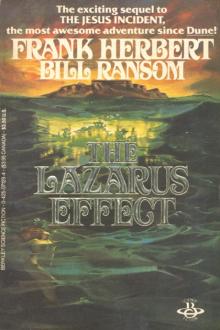 DV 3 - The Lazarus Effect
DV 3 - The Lazarus Effect The Jesus Incident w-2
The Jesus Incident w-2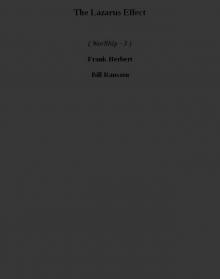 The Lazarus Effect w-3
The Lazarus Effect w-3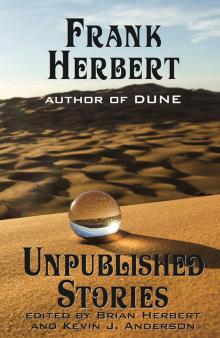 Frank Herbert
Frank Herbert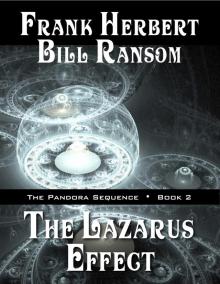 The Ascension Factor: Pandora Sequence
The Ascension Factor: Pandora Sequence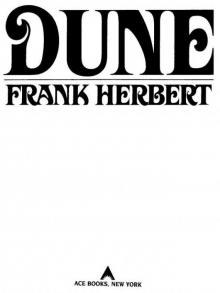 Dune (40th Anniversary Edition)
Dune (40th Anniversary Edition) The Dosadi Experiment c-2
The Dosadi Experiment c-2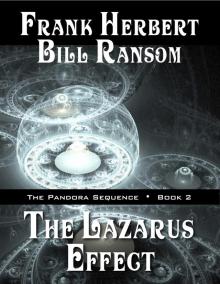 The Lazarus Effect
The Lazarus Effect God Emperor of Dune dc-4
God Emperor of Dune dc-4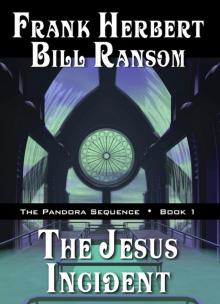 The Pandora Sequence: The Jesus Incident, the Lazarus Effect, the Ascension Factor
The Pandora Sequence: The Jesus Incident, the Lazarus Effect, the Ascension Factor The Green Brain (v4.0)
The Green Brain (v4.0) The Heaven Makers (v4.0)
The Heaven Makers (v4.0) Heretics of Dune dc-5
Heretics of Dune dc-5